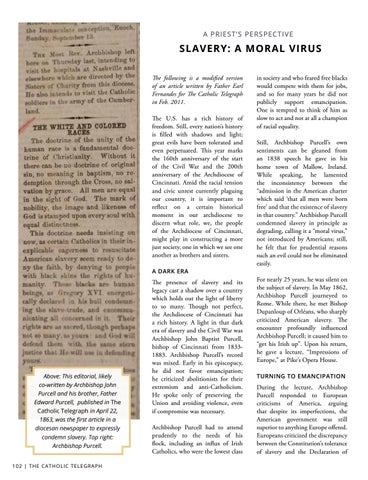A PR IE S T’ S PE R S PE C TIVE
SLAVERY: A MORAL VIRUS The following is a modified version of an article written by Father Earl Fernandes for The Catholic Telegraph in Feb. 2011. The U.S. has a rich history of freedom. Still, every nation’s history is filled with shadows and light; great evils have been tolerated and even perpetuated. This year marks the 160th anniversary of the start of the Civil War and the 200th anniversary of the Archdiocese of Cincinnati. Amid the racial tension and civic unrest currently plaguing our country, it is important to reflect on a certain historical moment in our archdiocese to discern what role, we, the people of the Archdiocese of Cincinnati, might play in constructing a more just society, one in which we see one another as brothers and sisters. A DARK ERA
Above: This editorial, likely co-written by Archbishop John Purcell and his brother, Father Edward Purcell, published in The Catholic Telegraph in April 22, 1863, was the first article in a diocesan newspaper to expressly condemn slavery. Top right: Archbishop Purcell. 1 0 2 | T H E CA THOLIC TEL EGR A PH
The presence of slavery and its legacy cast a shadow over a country which holds out the light of liberty to so many. Though not perfect, the Archdiocese of Cincinnati has a rich history. A light in that dark era of slavery and the Civil War was Archbishop John Baptist Purcell, bishop of Cincinnati from 18331883. Archbishop Purcell’s record was mixed. Early in his episcopacy, he did not favor emancipation; he criticized abolitionists for their extremism and anti-Catholicism. He spoke only of preserving the Union and avoiding violence, even if compromise was necessary. Archbishop Purcell had to attend prudently to the needs of his flock, including an influx of Irish Catholics, who were the lowest class
in society and who feared free blacks would compete with them for jobs, and so for many years he did not publicly support emancipation. One is tempted to think of him as slow to act and not at all a champion of racial equality. Still, Archbishop Purcell’s own sentiments can be gleaned from an 1838 speech he gave in his home town of Mallow, Ireland. While speaking, he lamented the inconsistency between the “admission in the American charter which said ‘that all men were born free’ and that the existence of slavery in that country.” Archbishop Purcell condemned slavery in principle as degrading, calling it a “moral virus,” not introduced by Americans; still, he felt that for prudential reasons such an evil could not be eliminated easily. For nearly 25 years, he was silent on the subject of slavery. In May 1862, Archbishop Purcell journeyed to Rome. While there, he met Bishop Dupanloup of Orléans, who sharply criticized American slavery. The encounter profoundly influenced Archbishop Purcell; it caused him to “get his Irish up”. Upon his return, he gave a lecture, “Impressions of Europe,” at Pike’s Opera House. TURNING TO EMANCIPATION
During the lecture, Archbishop Purcell responded to European criticisms of America, arguing that despite its imperfections, the American government was still superior to anything Europe offered. Europeans criticized the discrepancy between the Constitution’s tolerance of slavery and the Declaration of




























